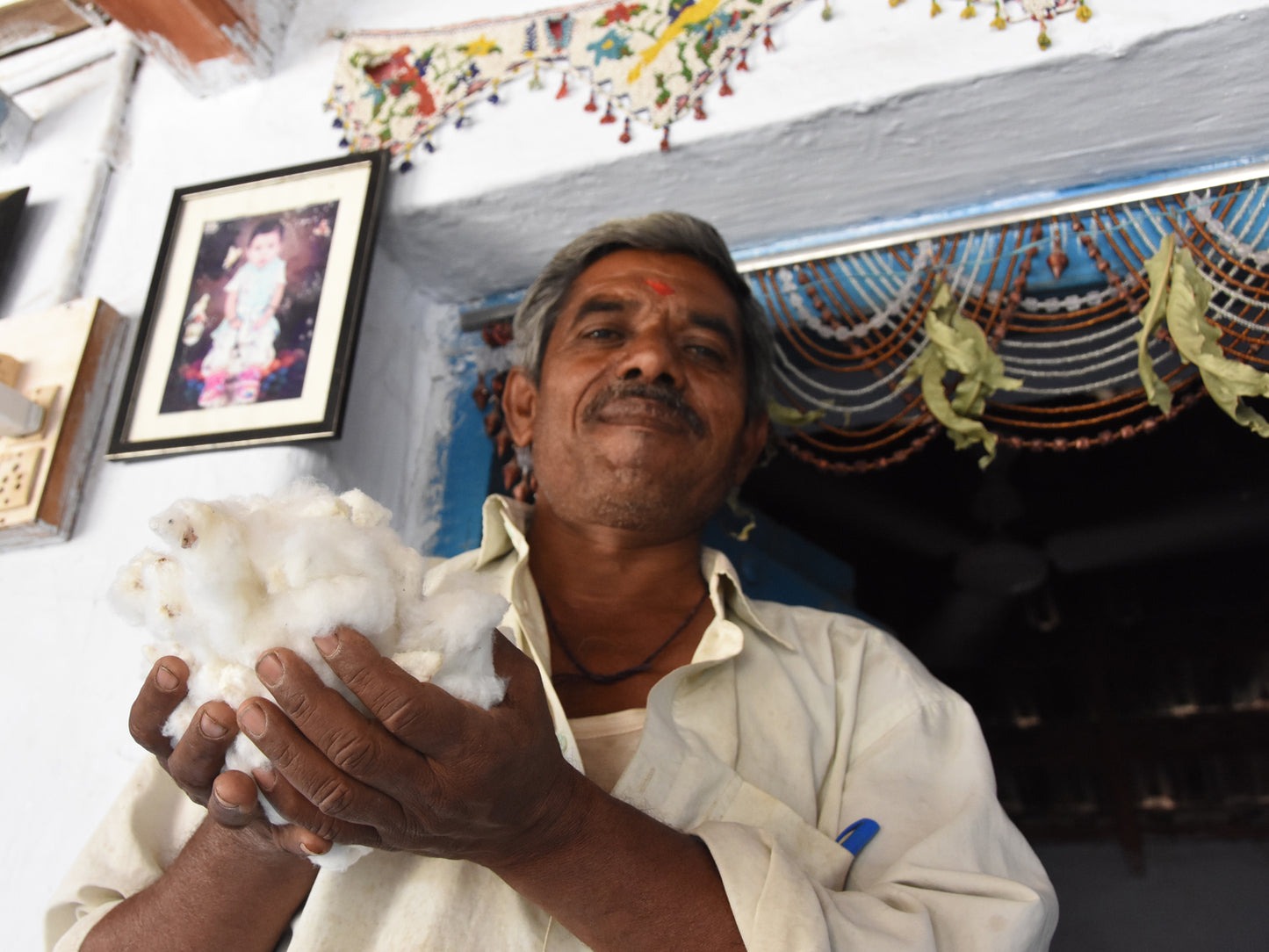About Fairly Traded Cotton

Organic Cotton Producers: Down to Earth
Cow dust hour – if you ever wondered where that expression comes from visit the village of Mevesa at dusk: cows, calves, oxen and water buffaloes are slowly making their way along the dirt roads, stirring up the dust as they walk.. Some animals come with their herders, others just follow a lead animal. After a long, hot day on what goes for pasture in this extremely dry part of western India they are on their way to the large water trough right at the centre of the village. There is a strict rank order, some animals can drink immediately, others have to await their turn.
Early evening is also the time of day when the women come out to have a chat with the neighbours while fetching water at the pump in the courtyard behind the trough. With grace and perfect posture they don’t just balance one, but often two full metal vessels on their head.
110 farm families live in Mevesa, a village about 70 km south of Rajkot in the Indian state of Gujarat. About half of the farmers work with Suminter, an Indian company that has a long track record of trading organic and Fairtrade cotton certified produce and products, while supporting the farmers they work with. Suminter not only does training in organic land management and animal husbandry, but also helps them to implement Fairtrade projects.
We meet some of the farmers on the porch of one of the farmhouses. The men wear traditional, sleeveless waistcoats, wide trousers and a longish piece of cloth, loosely arranged into a turban. The older men have beautifully decorated, broad silver bracelets, the younger ones sport mirrored sunglasses. The women sit towards the back but listen intently to the discussion. They not only help with the cotton harvest but also look after the cattle – only delivering the milk to the collection point is a man’s job.
For the farmers organic agriculture isn’t possible without cows. Manure is a precious fertilizer, and cow urine an essential ingredient of the bio-pesticides the farmers prepare themselves. They mix it with leaves and herbs: rule of thumb: anything a goat doesn’t eat, add sugar, and let the bitter brew ferment for a few days.
Oxen and bulls are needed for fieldwork. In organic farming no agro-chemicals can be used to grow fodder crops either. The feed has turned out to be of better quality, and as a result the quality of the milk has improved, too: it now contains more fat - which means a better price per litre for the farmers.
One of the projects the farmers decided to finance with the Fairtrade premium was a ‘cattle camp’. A vet checked out each animal and vaccinated it against a number of virus infections. The farmers learnt how to maintain better hygiene during milking to enhance the milk quality and how to spot symptoms of some animal diseases early enough to be able to treat them on the farm. The ‘cattle camp’ was a great success: while up to 20% of all cows used to die during any given year, the death rate is now down to just 5%.
Most farmers own no more than 7 or 8 animals, say two cows, three to four oxen, a water buffalo. Cows and oxen are so important that they almost enjoy the status of a four-legged family member. Amarshi Bhai lives in Dhola Pipaya, a village not too far from Mevesa. Next to the family photos on the porch is also a photo of a calf. It died when it was only two months old and for the family that wasn’t just a financial loss, it was an emotional one, too. Amarshi Bhai owns 1.2 hectares land. On about a third he grows cotton. With just three cows the family is one of the poorer ones in the village. Amarshi Bhai has to borrow the oxen of a neighbour to do field work. During a Suminter training he learnt how to make vermicompost and compost tea. The soilbeds for his worms need to be protected from the rain. Amarshi Bhai received Fairtrade money to build a roof and now shows neighbours and visitors how he works and uses the site to conduct training courses together with Suminter. Selling compost and compost tea is an additional income source for him, too.
Compost plays a major role in improving soil quality. Good soil can hold much more water than degraded soil. Usually it rains in Gujarat only during the monsoon, from the middle of June to September. Ten years ago farmers could almost mark the start of the monsoon on the calendar and it was easy to know when to seed. Now, in some years, there is no rain at all. In other years it rains so much in a very short time that a lot of the topsoil is washed away, even roads, bridges and houses collapse in the floods. In July of 2017, 580 mm rain fell in just 24 hours – that’s almost the average rainfall London gets in a year. Even the best soils cannot hold that much water, the farmers said, but since they are farming organically, their fields are less prone to suffer from droughts or floods than those of their neighbours.



